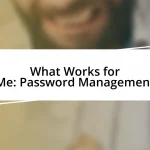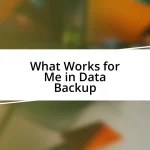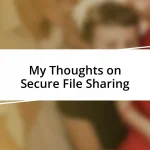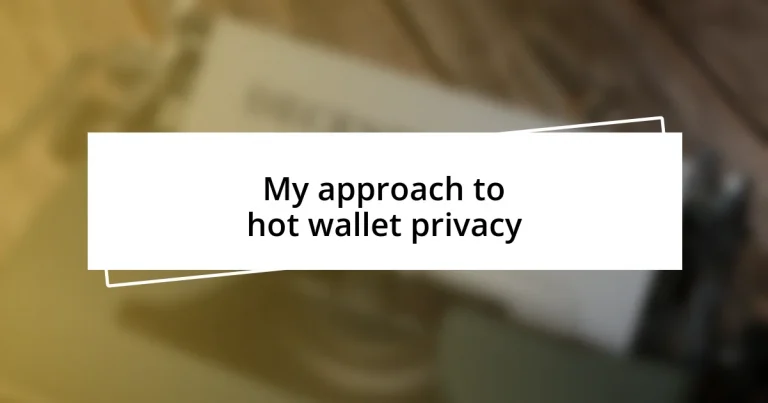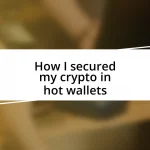Key takeaways:
- Hot wallets offer convenience for trading cryptocurrencies but are vulnerable to security risks like hacking, phishing, and malware attacks.
- Implementing strong security practices, such as using two-factor authentication, VPNs, and regularly updating wallet software, is essential to safeguard digital assets.
- Maintaining wallet privacy is crucial to protect personal identity and financial activities from exposure and potential exploitation.
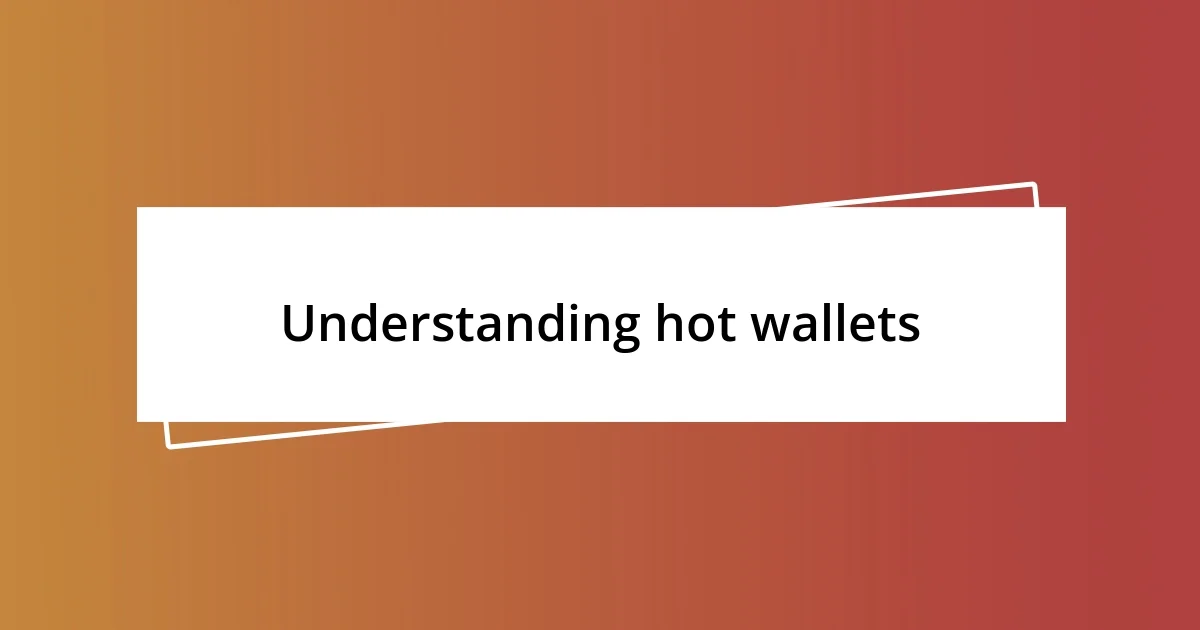
Understanding hot wallets
Hot wallets are digital wallets connected to the internet, making them quite convenient for everyday transactions. I recall my early days in crypto when I was thrilled to send and receive funds with just a few clicks, but I quickly learned that ease of access came with risks. It’s fascinating—how can something that feels so liberating also make us feel so vulnerable at times?
These wallets allow users to quickly access and trade their cryptocurrencies, which is thrilling! However, I often find myself wondering about their security. I had a close call when I didn’t enable two-factor authentication; it was a wake-up call that taught me how essential it is to protect my funds. Isn’t it ironic? The very feature that offers speed and accessibility can also be the chink in the armor of digital security.
While hot wallets are great for convenience, they can be less secure compared to cold wallets, which are offline. I remember a chat with a friend who lost access to his hot wallet due to a phishing scheme; it was heart-wrenching. This taught me that in the fast-paced world of crypto, staying informed and cautious is just as important as enjoying that convenience. Have you ever faced a similar situation? It really makes you rethink your approach to digital asset management.
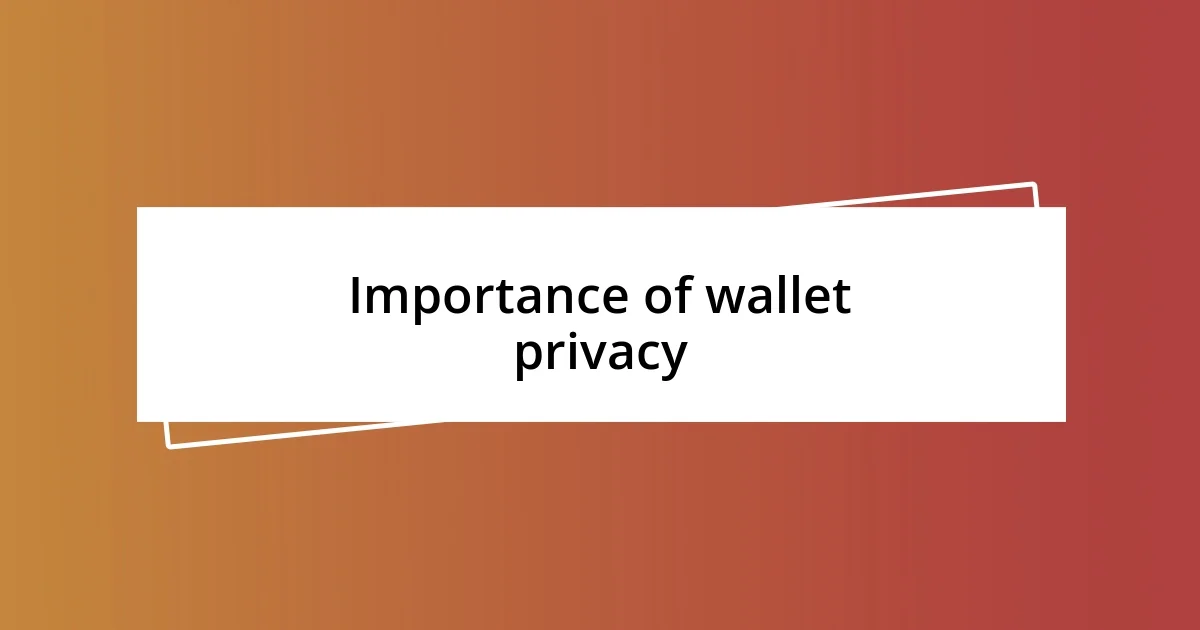
Importance of wallet privacy
Hot wallet privacy is crucial because it safeguards your identity and financial activities from unwanted exposure. I’ve often reflected on how easy it is to overlook this aspect when I’m engrossed in trading. One evening, after a particularly successful day, I realized that I had shared my wallet address publicly, exposing myself to potential scams. It was a stark reminder that our online presence has consequences, and while I find joy in sharing my journey, I must do so wisely.
The transparency of blockchain technology means that every transaction is traceable. I’ve encountered many newcomers to crypto excitedly discussing their latest trades on forums, unaware that they might be broadcasting their financial behavior to anyone who’s watching. This realization hit home when I watched a friend’s experience unfold; he received unsolicited emails and messages from scammers after he inadvertently exposed too much information. Protecting our wallets isn’t just about privacy; it’s also about defending ourselves from exploitation.
Investing in wallet privacy can also maintain the integrity of your holdings, establishing a personal barrier against hackers and malicious actors. I remember a time when I hesitated to move my funds to a new wallet due to concerns about privacy. I eventually made that leap, implementing additional measures like using privacy-focused wallets. It not only brought me peace of mind but also reinforced my belief in the importance of safeguarding my digital assets. How far are you willing to go to protect your financial privacy?
| Importance of Wallet Privacy | Implications of Poor Wallet Privacy |
|---|---|
| Protects Personal Identity | Exposure to Scams |
| Safeguards Financial Activity | Loss of Funds |
| Enhances Overall Security | Increased Vulnerability |
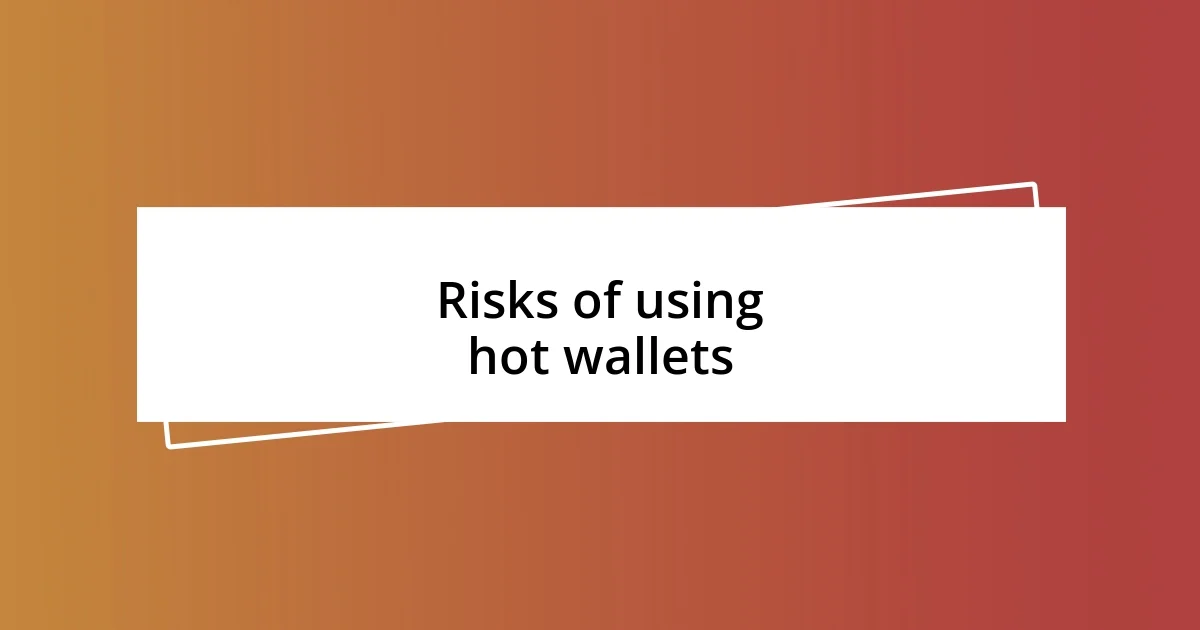
Risks of using hot wallets
I’ve had my share of tight moments when it comes to using hot wallets. One of the biggest risks lies in the constant connectivity to the internet, leaving your funds vulnerable to hacking attempts. I remember a time when a friend was excitedly showcasing his hot wallet to me, only to later discover that the wallet’s app had a vulnerability. It can be gut-wrenching to think that a moment of excitement can lead to significant financial loss.
Here are some risks to consider:
- Hacking: Hot wallets are targets for hackers due to their online nature.
- Phishing Scams: Users can easily be tricked into providing sensitive information through fake websites or emails.
- Malware Attacks: If your device is infected, malicious software can access your wallet.
- Unsecured Networks: Using public Wi-Fi to access your hot wallet can leave you exposed to network attacks.
Even with all these risks, using a hot wallet can feel indispensable—like having cash in your pocket. But it’s essential to approach it with caution. I’ve learned to double-check every link and avoid accessing my wallet on untrusted networks, almost treating it like a security ritual. Just as we lock our doors at night, we need to safeguard our digital assets, especially in the world of cryptocurrencies.
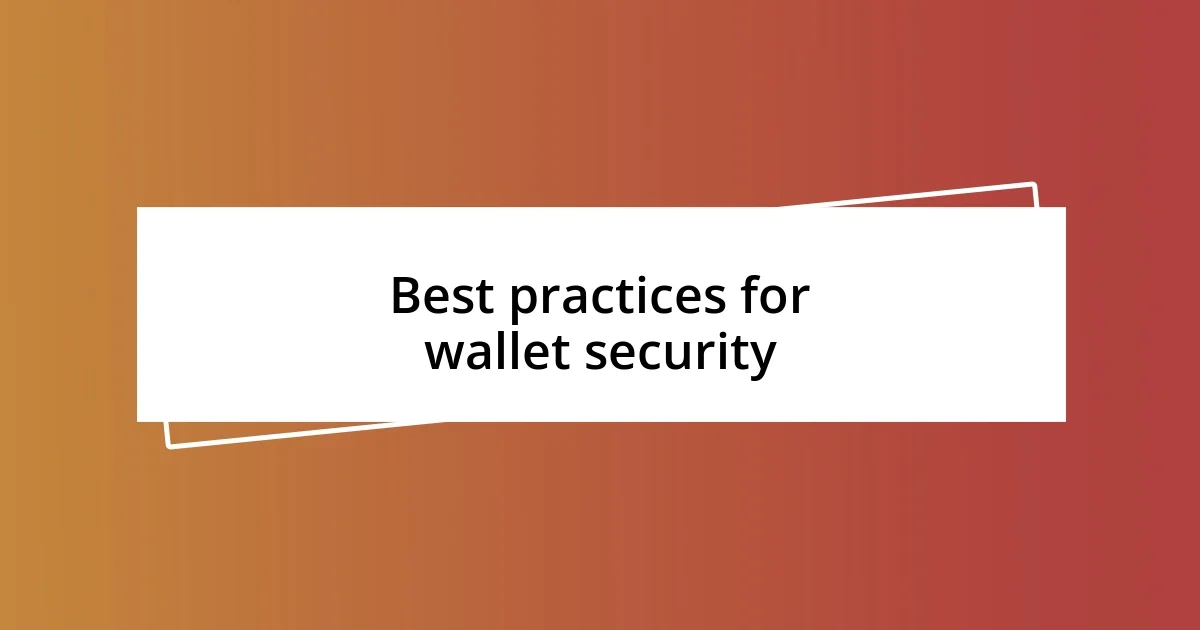
Best practices for wallet security
To enhance wallet security, always use strong and unique passwords. I used to think any password would suffice, but after nearly losing access to my wallet due to a weak password, I’ve changed my approach entirely. Now, I use a password manager to generate complex passwords—because who really wants to remember them all anyway? It’s a small step that creates a substantial barrier against unauthorized access.
Enabling two-factor authentication (2FA) is another critical practice. I remember a time when I didn’t think it was necessary—until a friend of mine had his funds drained because he skipped this step. It was a harsh wake-up call; 2FA acts like a second lock on your door. If someone gets your password, that added layer of security can sometimes mean the difference between keeping your assets safe and losing them completely.
Finally, always stay updated with the latest security patches and software updates for your wallet. I’ve seen how neglecting these updates can lead to vulnerabilities. During one incident, I was alerted to a breach in a wallet I used, and fortunately, I had updated it just a week prior. It was a close call! Regularly checking for updates is an easy yet crucial task that reinforces your protective measures. Why take the risk when a small effort can provide such significant peace of mind?
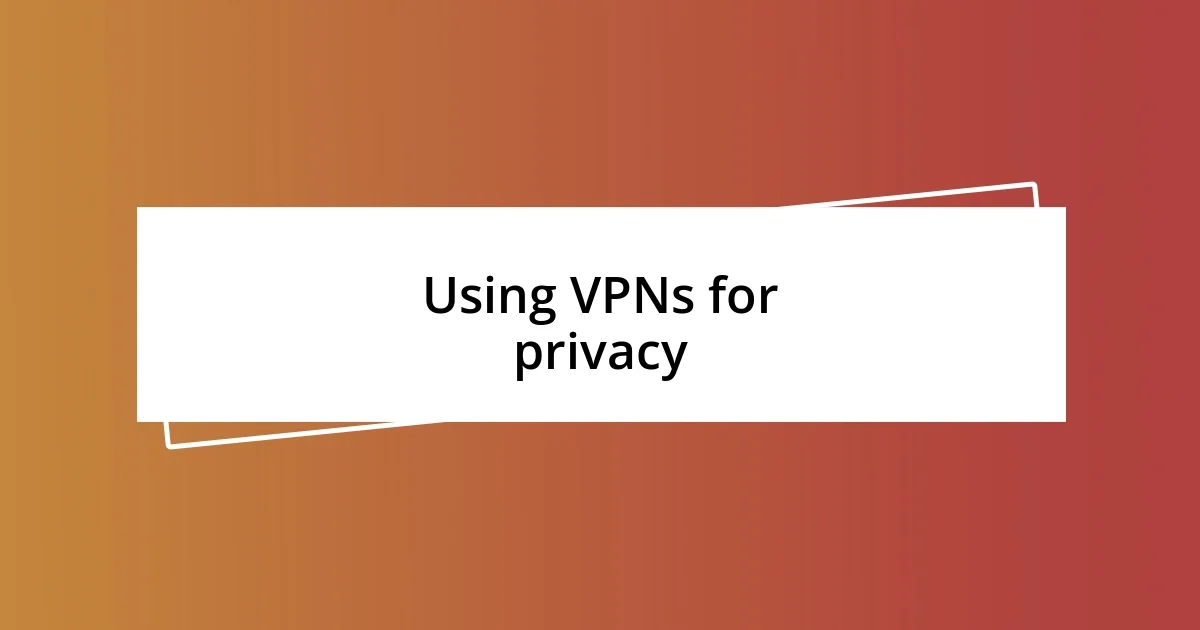
Using VPNs for privacy
Using a Virtual Private Network (VPN) is one of the best decisions I’ve made for my online privacy. It encrypts my internet connection, creating a secure tunnel that helps protect sensitive data from prying eyes. I can’t tell you how many times I’ve browsed on public Wi-Fi, only to realize just how exposed I really was. With a VPN, I feel a stronger sense of safety, knowing that my online activity is masked from potential hackers and snoopers.
There was a time when I was skeptical about using a VPN; I thought, “Is it really necessary?” Then I experienced a troubling moment while accessing my hot wallet at a coffee shop. Suddenly, I felt like a deer in headlights when I noticed someone looking at my screen. Luckily, I had my VPN activated that day, which gave me a sense of security that is hard to describe. It’s become a habit for me to connect to my VPN before accessing any sensitive online information—it’s like putting on my digital armor.
However, it’s essential to choose a reliable VPN provider. In the past, I made the mistake of going for a free service, only to learn that my data might have been sold to third parties. Talk about a wake-up call! I now invest in a reputable VPN that prioritizes privacy and has a no-logs policy, ensuring that I can browse and transact without unwanted scrutiny. Have you considered how easily your data can be compromised? A good VPN isn’t just a tool; it’s an investment in peace of mind while navigating the often murky waters of online transactions.
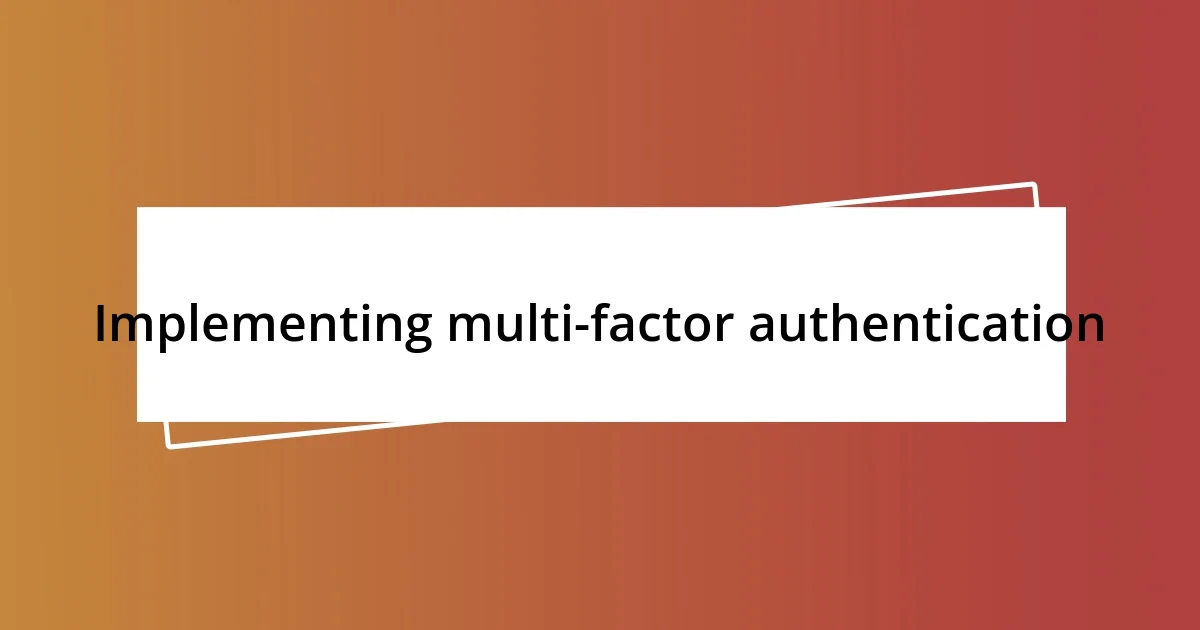
Implementing multi-factor authentication
Implementing multi-factor authentication (MFA) adds a significant layer of security to my hot wallet. I vividly recall a time when I forgot to configure MFA after setting up my wallet; it left me feeling anxious every time I logged in. Once I enabled this security feature, however, I felt a weight lifted off my shoulders, knowing that even if someone acquired my password, they’d still need a second form of verification to access my funds.
In my experience, using an authenticator app for MFA brings added peace of mind. After initially using SMS for two-factor authentication, I faced a situation where my mobile number was compromised, and I felt entirely vulnerable. Switching to an authenticator app not only enhanced my security but also eliminated the risk of interception through SMS. How would you feel knowing your sensitive accounts rely solely on a method that can be so easily broken? To me, that was unacceptable.
It’s also essential to remember the importance of keeping the device used for authentication secure. I once had my phone stolen, and it was a gut-wrenching moment. Fortunately, I had set up extra layers of protection, including biometric locks and device tracking. The thought that someone could gain access to my accounts if they got hold of my phone was terrifying. This experience reinforced my belief that protecting your authentication methods is just as crucial as implementing them in the first place. What measures do you take to ensure the security of your authentication devices?
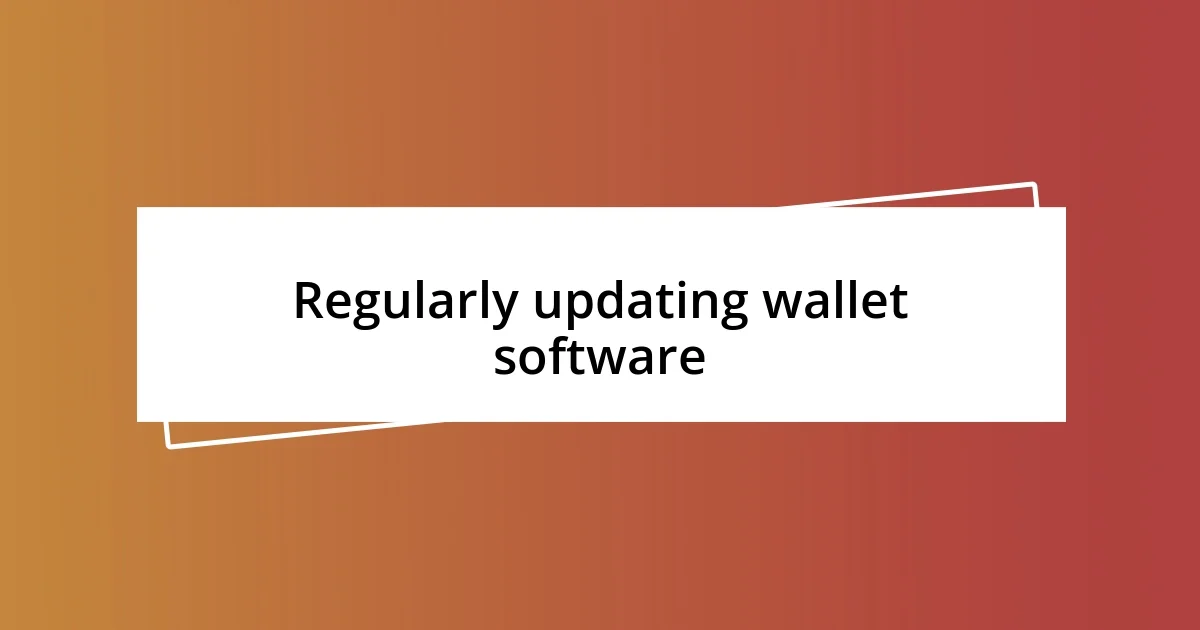
Regularly updating wallet software
Keeping my wallet software updated has become a non-negotiable habit for me. There was a point when I ignored those pesky update notifications, thinking, “If it isn’t broken, why fix it?” That mindset changed the day I read about a hot wallet vulnerability, which had just been patched in the latest update. The thought of my funds being at risk jolted me into action, reinforcing how critical regular updates are for security.
It’s astonishing how often developers release updates to enhance security and fix bugs. I remember feeling a slight wave of anxiety each time I would delay an update, like leaving my front door unlocked. Now, I approach each update with a sense of urgency and responsibility, as they’re not mere enhancements—they’re shields protecting my assets. Have you ever considered how different your experience might be if you let your software sit idle for too long? Trust me; keeping software updated is a small but mighty step toward securing your digital wealth.
I also appreciate how updating wallet software often includes new privacy features. Just last month, I noticed enhanced encryption options during an update that weren’t available before. This added layer reassured me that my transactions would be even safer against potential threats. It’s like discovering a bonus feature on your favorite app; I felt a sense of excitement and empowerment knowing I was taking proactive steps to secure my information. Wouldn’t you feel much safer knowing your wallet is equipped with the best tools available? Regular updates not only protect against vulnerabilities but also give you peace of mind in an ever-evolving digital landscape.
